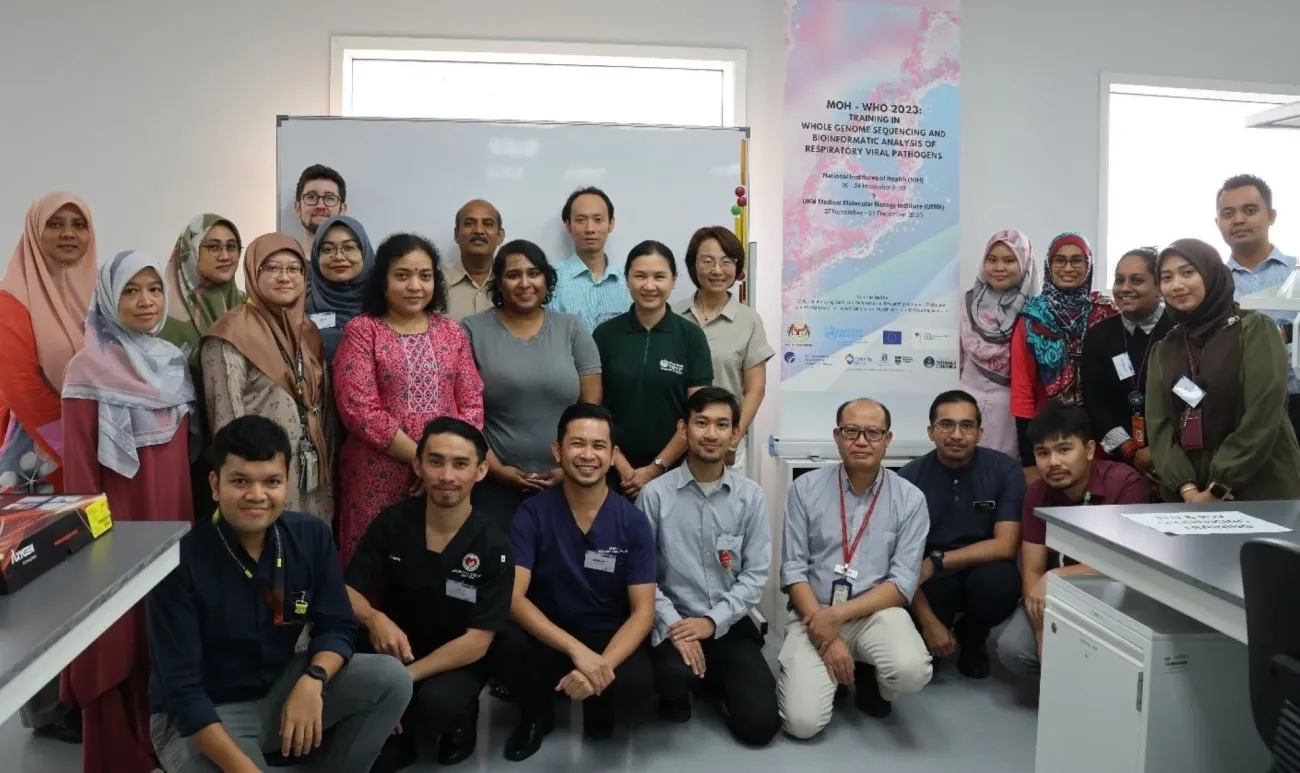Training in whole genome sequencing and bioinformatic analysis of respiratory viral pathogens

Genomics has been widely applied to tracking infectious diseases by sequencing the genomes of bacteria, parasites and viruses.
Genomics has been widely applied to tracking infectious diseases by sequencing the genomes of bacteria, parasites and viruses. Genomic surveillance is the process of constantly monitoring pathogens and analyzing their genetic similarities and differences.
Recognizing the importance of genomic surveillance, the Ministry of Health Malaysia and World Health Organization (WHO) Malaysia in collaboration with WHO Collaborating Centre (WHO CC) for Reference & Research on Influenza, the Centre for Pathogen Genomics at the University of Melbourne co-organized a training for Whole Genome Sequencing and Bioinformatic Analysis of Respiratory Viral Pathogens in November 2023.
The training aims to equip science officers, research officers and medical laboratory technologists from the various public health laboratories and the National Institute of Health of Malaysia with skills in analyzing viral genomic sequences and protocols for genomic characterization.
Experts from the WHO CC for Reference and Research on Influenza, Centre for Pathogen Genomics at the University of Melbourne, University of Melbourne, Universiti Putra Malaysia and the Institute for Medical Research Malaysia conducted the two-week training.
In her opening remarks, the Director of the National Public Health Laboratory, Dr Nik Jasmin Nik Mahir said, “This workshop marks a significant milestone in our journey towards advancing our capabilities in genomics, contributing to our nation’s preparedness for emerging respiratory pathogens.”

Hands-on training at the National Institutes of Health, Malaysia. Photo credit: WHO/Izarra Azuddin
On the first week, the participants underwent hands-on training in performing whole genome sequencing of influenza A, influenza B, and respiratory syncytial virus (RSV) using MinION. All participants successfully generated sequencing data for the respective virus samples.
The hands-on laboratory sessions were followed by bioinformatics analysis on the generated sequencing data. Participants were exposed to various bioinformatics tools used for analyzing the sequencing data and the process of uploading this data to an online database.

Expert from WHO CC Reference & Research on Influenza Melbourne conducting a lecture session at the UKM Medical Molecular Biology Institute. Photo credit: WHO/Izarra Azuddin
The training underscored the ongoing need for comprehensive understanding and surveillance of respiratory viruses is essential to track transmission patterns, identify new threats, and develop effective preventive measures, safeguarding public health.
This was made possible through the collaboration between WHO CC Reference and Research on Influenza Melbourne, Centre for Pathogen Genomics at the Doherty Institute, University of Melbourne and WHO, which have been instrumental in enhancing capacity in pathogen genomic sequencing.
“Building genomic capacity is crucial for preparedness and response in countries, enhancing the ability to swiftly detect, analyze, and combat infectious diseases, ensuring global health security, and strengthening surveillance systems to enable early warning and rapid response to potential public health emergencies with respect to the new Asia Pacific Health Security Action Framework,” said Dr Rabindra Abeyasinghe, WHO Representative to Malaysia, Brunei Darussalam and Singapore.
He added, “Collaborating with varied partners can strengthen global health security, ensuring a proactive and united front against evolving health threats.”
This workshop was supported by the European Union and the Federal Republic of Germany.


